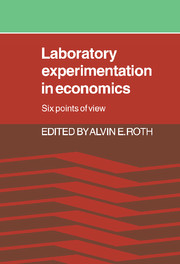Book contents
- Frontmatter
- Contents
- Acknowledgments
- List of contributors
- 1 Introduction and overview
- 2 Bargaining phenomena and bargaining theory
- 3 Equity and coalition bargaining in experimental three-person games
- 4 The psychology of choice and the assumptions of economics
- 5 Hypothetical valuations and preference reversals in the context of asset trading
- 6 Economics according to the rats (and pigeons too): what have we learned and what can we hope to learn?
- 7 Dimensions of parallelism: some policy applications of experimental methods
1 - Introduction and overview
Published online by Cambridge University Press: 24 October 2009
- Frontmatter
- Contents
- Acknowledgments
- List of contributors
- 1 Introduction and overview
- 2 Bargaining phenomena and bargaining theory
- 3 Equity and coalition bargaining in experimental three-person games
- 4 The psychology of choice and the assumptions of economics
- 5 Hypothetical valuations and preference reversals in the context of asset trading
- 6 Economics according to the rats (and pigeons too): what have we learned and what can we hope to learn?
- 7 Dimensions of parallelism: some policy applications of experimental methods
Summary
Each of the chapters in this volume concerns some aspect of economists' use of controlled experiments. Since the mid-1970s this kind of work has been transformed from a seldom encountered curiosity to a small but well-established and growing part of the economic literature. This transformation has been rapid. For example, when I began my own experimental work about a dozen years ago, it was most convenient to publish the results in journals of psychology and business. Today it is no longer unusual for controlled experiments to be reported in any of the major American economics journals. Experimental work has become well enough represented in the literature so that, in 1985, the Journal of Economic Literature established a separate bibliographic category, “Experimental Economic Methods.”
However, as might be expected of any newly developing field of scientific endeavor, there are at least as many points of view about the role of experiments in economics as there are economists who conduct them. One of the reasons for this is that “economics” encompasses quite a diversity of activities and methodologies, and controlled experimentation appears to have the potential to play at least a supporting role, and in some cases a far larger part, in many of these.
Information
- Type
- Chapter
- Information
- Laboratory Experimentation in EconomicsSix Points of View, pp. 1 - 13Publisher: Cambridge University PressPrint publication year: 1987
Accessibility standard: Unknown
- 6
- Cited by
